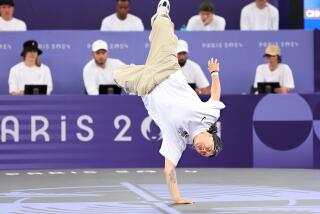London Olympics: British seek to capitalize on knowing territory
- Share via
LONDON -- It might have sounded like sour grapes.
The Australians were miffed about falling behind Britain in the medal count at the 2008 Summer Olympics. They grumbled British athletes won all the “sitting down” sports.
Rowing, cycling, sailing, kayaking.
“I’m quite fond of the Aussies,” British volleyball captain Ben Pipes said this week. “But they’ve got an attitude.”
The thing is, they were right. The British crossed the finish line on their butts for all but four of 19 gold medals in Beijing.
Four years later, at the 2012 London Games, the host nation hopes those less-than-vertical events — along with a few others — will contribute to an impressive home-court showing.
Olympic experts are predicting the British will reach the podium in the neighborhood of 60 times, winning about 27 golds. That would rank among the country’s most impressive performances ever.
“The ‘host nation effect’ impacts all events, “ said Simon Shibli, head of the Sport Industry Research Centre at Sheffield Hallam University. “It’s something we see at every Olympics.”
The Chinese walked away with 100 medals when they played host to the Games. Greece enjoyed a significant bump in 2004, as did the Australians in 2000.
Over the last 12 fully attended Olympics — not counting boycotted years — the host team has experienced an average gain of 13 medals, according to Ray Stefani, a statistician and professor emeritus at Cal State Long Beach.
The British, hoping to sustain that tradition, have adopted “Our Greatest Team” as their moniker.
Cyclist Chris Hoy should lead the cause. In other — non-seated — sports, distance runner Mo Farah, swimmer Rebecca Adlington and diver Tom Daley figure to contend.
Hammer thrower Sophie Hitchon recently echoed the sentiments of many British athletes when she talked about the advantages of competing on familiar ground.
“It’s just so much more exciting,” she said. “You’ve got the whole crowd behind you, the whole country’s behind you.”
But adoring fans don’t always help. Ryan Giggs, among the most decorated soccer players in English history, said he and his teammates feel added pressure to win. He figures the expectations will grow “bigger and bigger.”
The attention can be distracting, said Art Markman, a psychology professor at the University of Texas. Athletes competing in short, intense events are most at risk.
“If you’re running a marathon and your first half-mile doesn’t go so well, you have a lot of time to make up for it,” he said. “But some Olympic sports are over in a flash.”
Given the uncertain psychology of sport, Olympic scholars prefer to focus on more tangible factors.
The International Olympic Committee awards automatic spots to the host nation in numerous events. The British team will compete in dozens of sports, its team expanded from 311 athletes in Beijing to 542 in London.
More athletes equate to more medal chances. And they’ll know the territory.
English sailors have years of experience with the winds off Weymouth. The soccer players are familiar with the pitches at various Olympic venues around the country.
Even the BMX racers have devoted considerable hours to training at the relatively new track in Olympic Park.
With subjectively scored events such as gymnastics, boxing and diving, there can be an additional advantage. Studying the last six Summer Olympics, Shibli found host nations excelled in sports that involved judges.
“If you have a crowd baying for a home boxer, and every time he throws a punch they are cheering like mad, every now and again, that may have an impact on the judges,” he said. “These small margins can make a difference.”
Funding can also be important. In the years since the International Olympic Committee approved their bid, Shibli said, the British have spent hundreds of millions of pounds — much of it raised by the U.K. lottery — on preparing their national team.
Shibli calls it “a staggering amount of money to put into an elite sport system.”
Much of it went to the athletes and programs that showed the most promise, which explains why the British are so good at those “sitting down” events.
Cycling made a name for itself at the 1992 Barcelona Games when Chris Boardman — nicknamed “the Professor” for his technical approach to riding and training — won gold in the individual pursuit.
His victory attracted a new generation of fans back home and channeled more funding to the sport, which helped develop future stars. Just this week, Bradley Wiggins became the first Englishman to win the Tour de France.
Sailing has enjoyed a similarly impressive run, accounting for 16 medals in the last three Summer Olympics. Kayaking brought eight medals in that span.
This time around, the British have a good shot at medaling in five kayak events and half a dozen cycling races. The equestrian team — seated on its horses — could add to the count.
Pipes, whose volleyball team is not expected to contend, knows the stakes are high.
“It’s kind of a vicious cycle … without the results, you don’t get the funding,” he said. “But without funding, they say, you don’t get results.”
So he doesn’t much care what the Australians — or anyone else — think. He just wants British athletes to win for the hometown fans.
“We’ll see you on the field or the court,” he said. “That’s where everything is decided.”
Sitting or standing.
twitter.com/LATimesWharton
More to Read
Go beyond the scoreboard
Get the latest on L.A.'s teams in the daily Sports Report newsletter.
You may occasionally receive promotional content from the Los Angeles Times.







